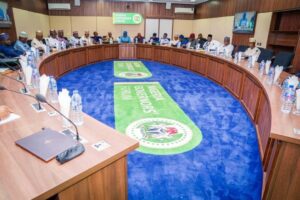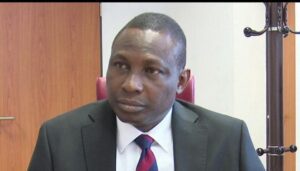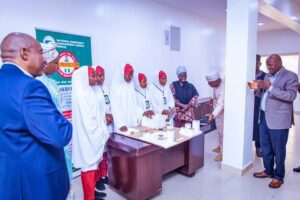
AfCFTA set to boost African exports by over 81%
Vice-President Kashim Shettima has expressed his confidence in the African Continental Free Trade Area (AfCFTA) to boost economic growth in Africa. Speaking at a breakfast meeting with African Heads of State to launch the Action Plan for AfCFTA, Shettima highlighted the potential of the trade agreement to increase Africa’s GDP by $450 billion in 2035 and exports by over 81%.
He emphasised the importance of increasing intra-Africa trade, which currently stands at 15 percent, and stressed that the AfCFTA agreement must not be allowed to fail due to its potential to raise the continent’s GDP. The breakfast meeting took place on the sidelines of the World Economic Forum in Davos, Switzerland.
“African trade is to be boosted by 52.3 percent by 2025. We should increase these targets and look at the trillions of dollars.
“African countries need to move quickly to iron out whatever agreements and impediments remaining to ensure free and smooth trade.
“Information sharing with private sector players must be optimized and prioritised. Trade is a private sector imperative, which governments only facilitate.”
Shettima observed that negotiations have turned out to be too slow, with clashes between national and continental priorities.
This, according to him, has led to too few consummated deals among countries since January 2021 to date.
“Looking ahead, there is a need for speed and cohesion among African countries. The idea of AfCFTA must not fail, and there is no room for mediocrity in today’s world.”
Citing examples of trade unions in Europe, the Americas and Asia, Shettima said African trade could not continue to be externalised.
“Even though we have increased intra-Africa trade from a mere seven per cent a decade ago, to about 15 per cent today.
“While Intra-European Trade is around 70 percent, there is a need for African leaders to do a lot better in organically empowering countries on the continent to solve their problems.”
He urged Africa’s private sector players to be proactive in stepping up to the plate to occupy their pride of place in trade on the continent.
Similarly, Shettima at a forum to welcome investors to a parley with Nigerian officials, told foreign investors that Nigeria was on the right path to becoming their delight.
He said President Bola Tinubu’s administration was on a drive to bring in the entire ecosystem of investors.
“From private equity players, to venture capitalists, impact investors and competent contractors from all over the world to partner with us in this quest.
“Nigeria occupies an enviable position as the continent’s largest economy and with the largest population.
“Nigeria is currently repositioning her economy away from crude oil dominance, with deeper footprints in technology, arts, culture, creativity and industrialisation.
“Recent developments in our energy sector portend that Nigeria is leading the region in energy security and energy transition.”
He said that international and domestic energy companies were already engaging the global community and subscribing to the innovations of the future.
Shettima maintained that Nigeria remained open to engage with willing nations on mutually beneficial and sustainable terms.
“This underscores why the country is a reference point for best global practices.
“We have our export, Dr Mrs Ngozi Okonjo-Iweala heading up the World Trade Organisation, meaning that Nigeria must show to be a shining example in the best global trade practices.
“Recently, Nigeria removed the infamous 43 trade items from foreign exchange ban, opening up the space entirely, in what is actually a very bold move, signifying full trade liberalisation.”
On efforts by the Tinubu administration in ensuring a conducive environment for investment, Shettima said Nigeria also totally liberalised the downstream petroleum sector.
He added that Tinubu removed the burdensome subsidies and instituted a market-driven foreign exchange market, which outlawed multiple exchange rates in the economy.
Shettima said the country intends to participate fully in the Global Value Chains (GVC) at many levels, aiming for good value capture as it becomes even more relevant to global supply chains.
He listed priorities for the country to include “repositioning our energy sector, investing in major infrastructure like our rail system, roads, new seaports, and digital technology for our vibrant youthful population to engage the world.
“Nigeria also targets a $1 Trillion economy within eight years and this requires that we grow our economy in leaps and bounds.
“A new era of accountability and productivity is being instituted under the guidance of President Tinubu.
“Nigeria is an investor’s delight. There is so much to do. So many sectors to engage in.
“We intend to make the country into a huge construction site in a matter of months. We have rejigged our revenue administration, and will soon match up with some of the most efficient countries in the world.”
Shettima also spoke about the emergence of new sectors such as the Blue Economy, Digital Economy, Steel sector, Gas Subsector, and Alternative Energy, among others.
He said under President Tinubu a lot was being done to reposition Nigeria’s image, tackle remaining pockets of insecurity and project Nigeria to the world.
“Nigeria’s diversity is her strength. We have over 300 different languages. Each culture has something to learn from others. And something to teach.”



